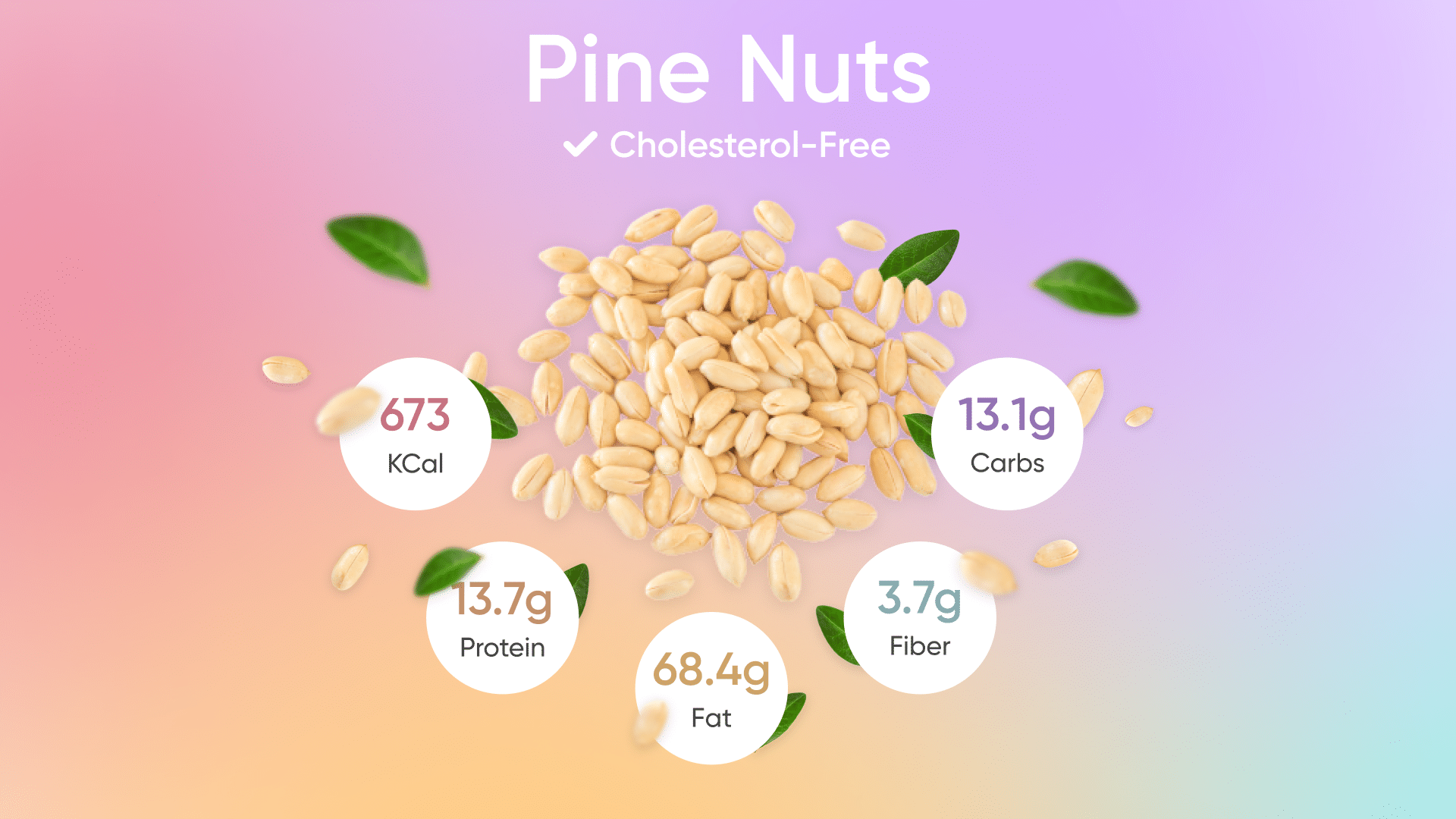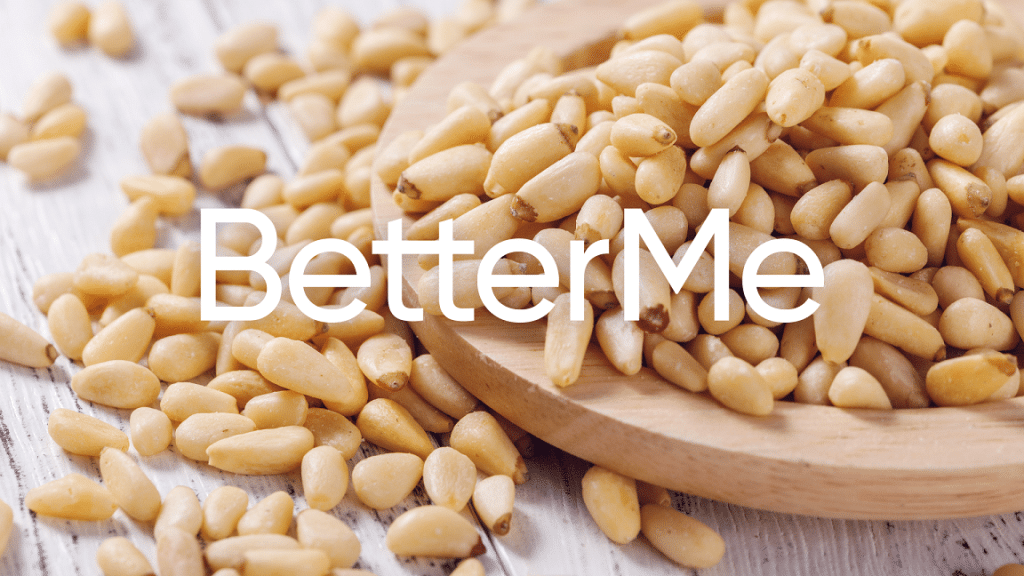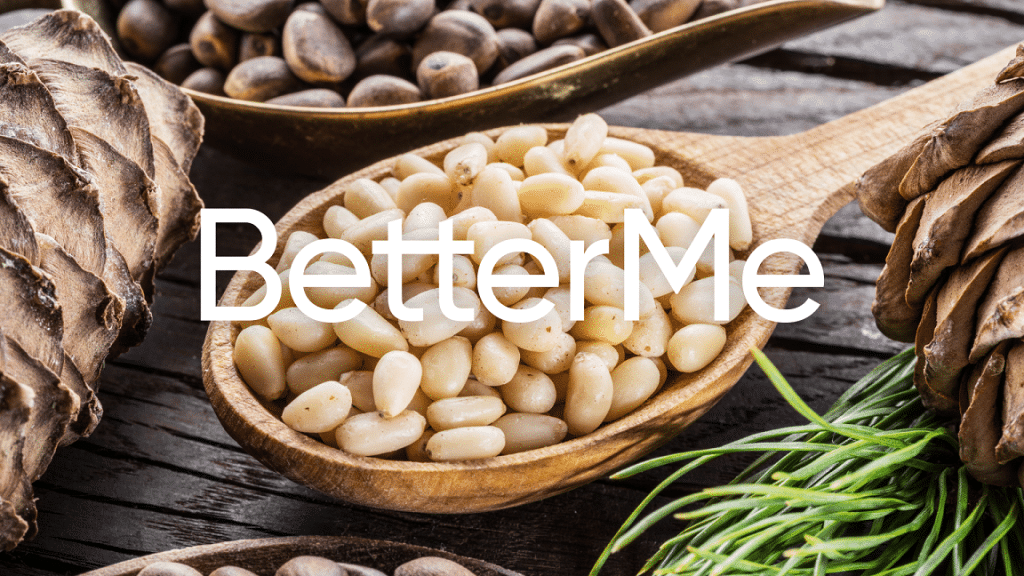Pine nuts are a type of seed gathered from pine cones. They can be eaten raw, roasted, or ground into flour. These seeds have been used in cooking for centuries and are believed to be one of the first foods ever to be eaten by humans due to their abundant supply, high nutritional value, and because they don’t require any preparation before consumption.
In addition to the culinary uses of these seeds, they also provide some great health benefits that make them a great addition to a balanced diet. This article will go over what you need to know about the nutritional value and benefits of this healthy food choice.
Pine Nuts Nutrition Facts
Pine nuts contain essential proteins, dietary fiber, carbohydrates, omega-3 fatty acids, potassium, magnesium, and phosphorus. According to the USDA, 100 grams of these nuts has the following nutritional profile (11).
- Calories: 673 kcal
- Fat: 68.4g
- Sodium: 2mg
- Carbohydrates: 13.1g
- Fiber: 3.7g
- Sugars: 3.59g
- Protein: 13.7g
Pine Nuts Health Benefits
Thanks to their rich nutritional profile, these nuts offer the following health benefits:
Disease Prevention
They are also high in antioxidants which help to prevent diseases such as cancer. These antioxidants come from the oils found in pine nuts. The most important of these oils is pinolenic acid which has been shown to have anti-inflammatory effects in human cell lines from patients with rheumatoid arthritis (2).
Pine nuts also contain pinitol which helps insulin do its job of allowing glucose into cells, helping blood glucose levels to remain in an appropriate range. Pinitol works together with insulin, making insulin’s job easier and potentially improving glycemic control in patients with insulin resistance (3).
Read More: Brazil Nuts Facts, Calories, Health Benefits And Side Effects
Cardiovascular Health
Pine nuts are high in omega-3 fatty acids which help to regulate blood pressure and cholesterol levels. These types of fats have also been shown to reduce the risk of heart disease, prevent blood clots, lower triglyceride levels, and support brain health (8).
Weight Loss
The fiber contained in pine nuts can slow down digestion which helps you feel full longer after eating them. This is great news if weight loss is on your agenda because it means that they make a good choice for snacks at any time of the day.
These nuts also contain pinolenic acid which may improve glucose tolerance and keep blood sugar levels more steady, which means that they might be useful for preventing cravings after meals (1).
Improved Cognition
Pine nuts are great for making the brain function at its best thanks to their abundance of omega-3 fatty acids. This allows neurotransmitters in the body, which carry messages between nerve cells to be created effectively and it also improves cell membrane health. Diets high in omega-3 fatty acids are thought to potentially help improve memory and prevent cognitive decline.
Improved Gut Health
Pine nuts and other nuts can help support digestive health due to their fiber content. Fiber helps promote regularity and can also support a healthy microbiome (6).
Looking for a way to break the vicious cycle of weight loss and tone up all the jiggly parts? Watch the extra pounds fly off and your muscles firm up with the BetterMe app!
Pine Nut Side Effects And Precautions
There are some precautions and side effects that you should be aware of before buying pine nuts. These include:
May Worsen Inflammation
Pine nuts may aggravate medical conditions such as arthritis or inflammatory bowel disease because they contain omega-6 fatty acids in the form of linoleic acid which increases inflammation when eaten in large quantities. This is why it’s important not to buy supplements containing great amounts of this oil if you suffer from any condition like these ones (4). Eating pine nuts in moderation is unlikely to be a problem.
May Cause Allergic Reactions
Just like other types of nuts, pine nuts can cause allergic reactions in some people.The effects of an allergic reaction include (10):
- Headache
- Indigestion
- Nausea
- Vomiting
- Hives
- Itchiness
- Shortness of breath
- Swelling of tongue and throat
Read More: Are Almonds Fattening? The Truth About These Crunchy Tree Nuts
High-Calorie Intake
There are approximately 673 kcal in a 100 gram serving of these nuts (11). If you’re eating them as a snack, it’s important to eat the right amount to avoid gaining weight from eating too many calories which can lead to other side effects that will make it difficult for you to stay healthy. The usual recommended serving size of most nuts is 1 ounce (around 28 grams or a small handful).
The Bottom Line
Pine nuts are often overlooked when it comes to healthy superfoods that can add a lot of flavor and texture to your dishes. Since they’re rich in nutrients, fiber, healthy fats, and protein they’re a great snack on their own or an addition to salads and pasta meals.
Get your personalized
meal plan!
DISCLAIMER:
This article is intended for general informational purposes only and does not address individual circumstances. It is not a substitute for professional advice or help and should not be relied on to make decisions of any kind. Any action you take upon the information presented in this article is strictly at your own risk and responsibility!
SOURCES:
- Activity of dietary acids on FFA1 and FFA4 and characterisation of pinolenic acid as a dual FFA1/FFA4 agonist with potential effect against metabolic diseases (2015, pubmed.gov)
- Anti-inflammatory and immunoregulatory effects of pinoleic acid in rheumatoid arthritis (2021, oup.com)
- Effects of pintol on glycemic control, insulin resistance and adipocytokine levels in patients with type 2 diabetes (2011, pubmed.gov)
- Linoleic Acid: A Nutritional Quandary (2017, nih.gov)
- Nut consumption and body weight (2003, oup.com)
- Nuts and their Effect on Gut Microbiota, Gut Function and Symptoms in Adults: A Systematic Review and Meta-Analysis of Randomised Controlled Trials (2020, nih.gov)
- Omega-3 Fatty Acids (2015, pubmed.gov)
- Omega-3 Fatty Acids and Heart Health (2015, ahajournals.org)
- Pesto sauce recipe (2006, bbcgoodfood.com)
- Pine nut allergy: Clinical features and major allergens characterization (2012, wiley.com)
- Pine nuts (2020, usda.gov)












